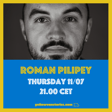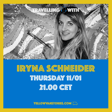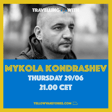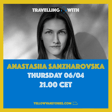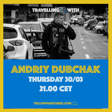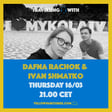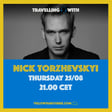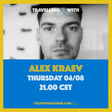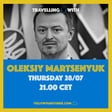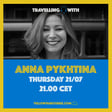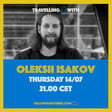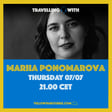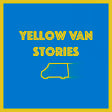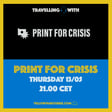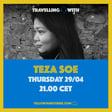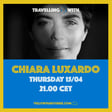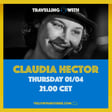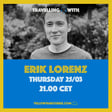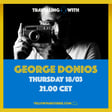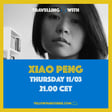Emotional Turmoil and Artistic Struggles
00:00:07
Speaker
For me, when war has started, I couldn't make any art because I was so worried about my niece, who is also three, four years old, little girl, and I was worried about my friends, about my parents, so I couldn't make any art stuff. After two months in the end of April, when I came back to Kiev,
00:00:30
Speaker
I was full of ideas, so I wanted to express myself finally, because I saw my parents, I saw my niece, I saw a lot of my friends, they're okay, everyone is alive. Okay, now I can express myself better, now I can have my place, because I couldn't find peaceful place, it's difficult. And I just, okay, doesn't matter, anything, I just wanted to create
Introduction to Ukrainian Stories
00:01:02
Speaker
Hi and welcome to a new episode of the Elo Van Stories. I'm your host and driver Bastian.
00:01:08
Speaker
We are very happy and grateful that you have found your way onto the yellow van again today. We've been waiting just for you and kept your usual seat by the window side. After Russia's invasion of Ukraine, the topic of the second season became very clear to us. We decided to invite Ukrainians into the van to share their stories with us and to learn more about Ukraine's cultural identity because too often it has been appropriated by a chauvinistic Russian narrative.
00:01:36
Speaker
the same narrative that now serves as a pretense to the war. So supporting Ukraine in our opinion therefore has a very strong cultural dimension as well. Fonz is in first gear already and we are good
Meet Gayane Arushanyan
00:01:49
Speaker
to go. So buckle up and sit back because today we're going to meet Gayenne in New York.
00:02:02
Speaker
Hello and welcome to a new episode of the Yellow Van Stories. Today with us is Gayane Arushanyan, a multidisciplinary artist from Kiev. Hi, Gayane, it's such a pleasure to have you today. Hi Bastian, thank you so much for inviting me to be here with you.
00:02:19
Speaker
Thank you for taking the time. It's really, I am so happy I, because to be honest with you, I, I, you know, when I found your art and I found you, um, I was just so taken in by what you do. And, uh, and, and I, I feel it's an amazing privilege that you are here today that we can talk about your art a little bit. Um, what you do, how you got into it. I'm very much looking forward to it. So glad you are here.
00:02:42
Speaker
Thank you so much. We will have a nice time discussing everything.
00:02:50
Speaker
Absolutely. We will. I have no doubt about it.
Art as Honesty and Balance
00:02:54
Speaker
And therefore, just so the listeners get a bit of an idea for who you are, what you do, I've just written a little bit of an introduction, and I'll read it out. And if there is anything I got wrong, by the way, let me know. And then you can rectify it right afterwards. But, you know, I hope I didn't. Let's see. Let's see how well I did this time. Okay? Okay. Okay. All right.
00:03:19
Speaker
Gayane Arushanyan is a multidisciplinary artist from Kyiv. She is the founder of the School of Experimental Art in Kyiv and the G-Arts Studio in Sapurisha. Gayane is not only an outstanding artist, she also has a master's in urban construction and design and economic cybernetics from the Sapurisha State Engineering Academy.
00:03:38
Speaker
Her mathematical knowledge together with her artistic eye and love for color enables her to create shapes, forms, and color patterns oscillating between harmony and chaos. She herself says about her art, I have always believed that art was and it is the source, the way, the opportunity to be honest with myself and the world around. Equilibrium is about finding the balance of the image of the world, the world within. Color, shapes, and composition are the only criteria of harmony for me.
00:04:06
Speaker
There is an ideal state of the world around, and it's chaos.
War Memories and New Beginnings
00:04:10
Speaker
And all of this is in the indefinite darkness that you and I reveal every day. Gayane was born in Armenia and had to flee her home when the first war between Armenia and Azerbaijan broke out. And in our prep call, she said that the Russian invasion of Ukraine on the 24th of February last year made a lot of those memories resurface.
00:04:29
Speaker
So today we want to take a look at Gayane's very personal story of becoming an artist, the Ukrainian art world in a more general way and the challenges it faces because of the war. And a lot more, of course. So it is a great pleasure and privilege to have you with us in the yellow van today, Gayane. Welcome aboard. Thank you so much. Thank you so much. Thank you for inviting me.
00:04:53
Speaker
it's, well, thank you for coming. That's the, you know, the invitation is the one thing, but taking the time is marvelous, especially, and this is what we're going to get into right away. You are, where are you right now? Actually, you should say where you are right now.
New York Exhibition and Inspirations
00:05:06
Speaker
Yeah. I'm in New York now. I came here. Okay. Not in New York in general. I'm in New York now, but I came to US months ago. I came here to
00:05:20
Speaker
see the city, to see life here, to find some opportunities to go forward, to show my art and show my experience I have and I had in my life. You have an exhibition as well, don't you, in New York? Yes, I had a small exhibition in New York.
00:05:44
Speaker
I would say it was a night party of the art collectioners of New York, where I had an exhibition. And also I took part in another exhibition, which calls Design on a Dime. All right. That's a nice name. Design on a Dime. Yeah. Okay. And so it was a group exhibition, I suppose.
00:06:10
Speaker
Yeah, the second one was a group exhibition. And the first one was only my soul exhibition, but it was very private exhibition, like only for invited people. So that's even more of a privilege than to see your art there. Is it actually your first exhibition in New York or have you had exhibitions before that?
00:06:35
Speaker
In New York, no, never. I had before an exhibition, group exhibition in Chicago in ARC Gallery, but never in US.
00:06:46
Speaker
that must be very exciting for you to be there to see it, isn't it? I mean New York is like the, you know, the dreamland in a way, you know, the biggest city, such a striving, such a, you know, colorful and powerful art scene to be exhibiting there. It must be a dream come true in a way, right? Yeah, yeah, yeah.
Family Worries Amidst Conflict
00:07:08
Speaker
I was dreaming to see New York and
00:07:11
Speaker
Actually, I've never dreamed to see New York in such a situation. But anyway, I'm so excited that, oh my God, I'm here. I'm in New York and I can not can. I had an exhibition in New York and I can see all this beautiful architecture, which inspires me a lot and history and everything.
00:07:38
Speaker
possibilities, opportunities. This is inspiration. Amazing. I'm very happy for you and it's also nice to start off on such a beautiful and positive note that you are there and you're exhibiting. I think that's a wonderful entry into our conversation.
00:07:58
Speaker
Just also on another note a little bit, because I do this with all my guests, right? Because also to remember what is going on in Ukraine at the same time. How are you doing otherwise? And also family, friends? How are you in your immediate environment? How are things for you at the moment?
00:08:17
Speaker
So last night, Russia fired three cities where my parents, my friends, and some of my relatives living. So they fired Zaporizhia, where my parents are living, and thanks God they're okay. Also, they fired Kyiv, where is my sister living, and all of my friends living.
00:08:43
Speaker
things got there also okay and also Odessa where is my close friends living so again they are alive you know when people asking me how are they the only question I have they are alive I can't say how are they because also when I was in Ukraine this feeling that you already adapted to
00:09:10
Speaker
to the war, and actually it's awful, it's not okay to be adapted to this kind of situation, but I have no other
Adapting to War Conditions
00:09:24
Speaker
I've had this before. For me, it's very hard to imagine that you would get accustomed to something like war, but I've heard it before from other people I've interviewed. And that is, I think, an actual tragedy that you have to get used to something like this, this uncertainty and the not knowing of any kind of future and this constant fear also.
00:09:53
Speaker
or for your loved ones, for friends, family, it's hardly imaginable for me. I can't do it and it's always very sad for me and tragic to hear it. Does giving and just also, but does being in New York at the moment give you a little bit of a relief to this? Like is this being away from Ukraine and in New York where, you know,
00:10:17
Speaker
you are safe? Does it give you some sort of relief? Or does the worry of about people in Ukraine, your loved ones, overwhelm the feeling of the, you know, the positive feeling of being in New York? I think I can control myself. So it's not, I'm not getting to panic quickly. So
00:10:45
Speaker
It's not overwhelming. But at the same time, I'm thinking a lot about my parents, about my friends, about people are dying. As you know, I think you read about last news in Cherson, about 30 people died and in Uman, and also about 23 people died.
00:11:10
Speaker
Anyway, maybe I don't know that people. Yes. But I'm thinking about that because this is the place I was born. This is the people I know, like in general, this is about Ukrainian people. So I'm thinking about that, like, oh, maybe it's just human part of me. You know, it's okay to think about this, but also thinking about my parents and about my friends.
00:11:41
Speaker
I'm just trying to be calm and also, at the same time, I understand that nothing is in my hand. Everything I can do, I'm doing my best, everything. But I can't just stop the war. Unfortunately, I can't do it. So this is the feelings I have. But I feel safe in New York.
00:12:07
Speaker
And even more in New York, I feel like I'm in Kiev.
Cultural Adaptation from Armenia to Ukraine
00:12:11
Speaker
I don't know, New York has this energy, you know, everything is fast. Somehow I share these feelings about New York as about Kiev. And I feel even lonely here. I don't know why, but I don't feel lonely here in this city.
00:12:35
Speaker
That's very nice to hear. I'm sure you meet a lot of people as well, also through the exhibitions and people wanting to meet you and who is this woman that paints these amazing, amazing images. So I'm sure you have enough people coming and going and saying their hellos and I'm sure you're not bored. Exhibitions are a wonderful thing in that sense because you meet a lot of new people, right? Yeah.
00:12:58
Speaker
If you, because I said in the introduction as well that you were actually from, you were born in Armenia and you had to leave the country at three years old because of the first war between Azerbaijan and Armenia. And you said a lot of the feelings from back then have resurfaced a little bit or it reminded you of that to some degree. Can you describe a little bit how it reminded you or how it took you back to that time?
00:13:29
Speaker
I remember in 2014 when war has started in Donbass. I was living with my parents in Zabryzia. And we have this, I don't know how they call it, they just were practicing air raid sirens in every city of Ukraine.
00:13:53
Speaker
And I remember I was in a public transport and in the city center. I've heard that air raid sitting and it was such a flashback to my childhood. And I can't explain it. This is the thing. You just, you just feeling it because I was too small, maybe to understand. Yes, but I felt that. So.
00:14:21
Speaker
I had that first flashback in 2014 in Zabryzia and also the same flashback I had on February 24,
00:14:41
Speaker
when war actually not war full escalation yes invasion started in Ukraine and actually I woke up at five o'clock because I've heard the explosions and there was this these explosions were explosions in Borisville where is
00:15:09
Speaker
the most important airport of Ukraine is situated. And about between 7 and 8 a.m. I heard again that air raid Syrian and again I felt that feelings and it
Ukraine's Multi-Ethnic Dynamics
00:15:30
Speaker
It wasn't panic. It was, I don't know, it's like something between life and death. You know, something between these two lines. This is the feeling I can express like, like this. Uh, but then I understand like no panic. If it starts now, uh, I should do something.
00:15:56
Speaker
So I just understand, okay, my first aid kit, my everything, like my clothes, everything I need, my documents, I prepared everything. And I was ready, I don't know, for everything. At this time, I've heard that air raid scene, I was ready for everything, but I was trying not to panic. So I just, you know,
00:16:25
Speaker
I think I left the feelings in the past and I understood that all I have is now and now I should be strong. I am not that little kid.
00:16:40
Speaker
I'm not three, four years old, now I'm strong and I can do everything I can do now and prepare all my stuff to be ready for war and to go to the shelter, I don't know.
00:16:59
Speaker
Yes. What you also said is because you started off with 2014 and we have pointed it out before in this podcast as well. I think in order to understand the current war and the invasion of Russia in Ukraine, you have to actually go back to 2014 and see this as a conflict that was actually started back then, not in 2022. It was just a frozen conflict.
00:17:23
Speaker
But it was the same war that is going on now that was actually started in 2014. Would you agree with that? Yes, of course. Of course. It wasn't frozen. It was going on just it was in Donbass. It wasn't frozen.
00:17:40
Speaker
I mentioned geographically, but you are absolutely right. That wasn't the best term. Yes, you're absolutely right. Very, very good to point that out. Yeah. So that's why I wanted to say that just in that context, because we come across this a lot of the times and I do believe really a key in understanding what is happening is in not making the mistake of just starting this in 2022.
00:18:01
Speaker
A lot of the times also I hear nobody really wanted to believe that this is really imminent, that this might happen on 24th of February. How was it for you? Did you see something like this coming or were you surprised as everybody else when the news struck you? It wasn't a surprise for me, but I didn't believe it's possible. It's 21st century.
00:18:27
Speaker
And it's the center of Europe. I couldn't believe it's possible such a full-scale invasion. Because of my experience with Armenia, I understand that it happened somewhere on the borders, somewhere close to Russia, just politically.
00:18:51
Speaker
the full invasion and Ukraine is such a huge country I couldn't just imagine so when we heard news when we read the news in newspaper and everywhere about full invasion the Russia is going to invade Ukraine and
00:19:13
Speaker
I was like, no, no, it's not impossible. It's not impossible. But then when full invasions started, okay, I understand. If it started, it means that it will not finish so soon. Like many politicians, as you know, said like, two, three weeks. No, no, no, it's not going to finish so soon.
00:19:42
Speaker
How did it make you feel? Was it because being ready is kind of neutral, if I think about it?
Impact of the 2014 Donbass Conflict
00:19:51
Speaker
Being ready is about one of the feelings inside of me, but at the same time, I was so angry about that.
00:20:04
Speaker
I had a lot of questions in my head and also by the way in 2014 I wrote a poem
00:20:19
Speaker
which are just questions and It was like how it's possible why people should die and why it's happening in 21st century I had a lot a lot of question. I still have that a lot of questions. Oh me too Yes But at the same time It was like I'm really I don't know
00:20:48
Speaker
to fight with my feelings because I didn't want to be weak because I saw a lot of people who were in stress, who were in panic, and I understand, okay, I'm not that kind of people, that kind of, I don't know, people are different.
Integrating into Ukrainian Society
00:21:12
Speaker
And some of them didn't see the war and some of them didn't feel the feelings I feel. So now I should be strong and I can help some people to be stronger than they are now because they are not there and panic and they need my help.
00:21:32
Speaker
Wow. It seems to be very clear nonetheless, like your mind was very clear. That's amazing. Even though I also hear that surprisingly from a lot of people that anger is an emotion that most people felt as well and including me as well. I felt so incredibly angry and I was so far away nonetheless, but I felt such an anger that day and the following days and I still do. So I absolutely relate to that.
00:22:01
Speaker
I'd like to turn our attention a little bit away from the immediacy of the water and go a little back to how it started with you as well. When you were three years old and you left Armenia and came to Ukraine, right? Ukraine is a multi-ethnic state with a lot of different cultural influences, which makes Ukraine an incredibly interesting country to study, to understand, to try and understand in my case actually more than anything.
00:22:31
Speaker
How was it? Do you remember your moment of arrival in Ukraine, how it felt for you to be there at three years old or is that too long ago? No, I remember a lot of things. I don't know. I don't know how, maybe because I'm the person who, I don't know, who feel some
00:22:53
Speaker
who have very, very deep feelings about something and I understand it through the, I don't know, through the space, through the thoughts, through, I don't know, some feelings of another people. So that's why, I don't know, I think maybe because of this, I remember a lot of things.
00:23:17
Speaker
The second time we came to Ukraine because it was two times. First we came to Ukraine and then we came back again to Armenia because it was very hard for my father and my mother to start something in Ukraine because we were three kids. I can't even imagine that. I have no kids now, but I can't imagine how it is difficult.
00:23:43
Speaker
And second time, when we came back, my grandfather and grandmother, they said, you will not find a peace and you will not find a good job to raise your kids. So go back to Ukraine.
00:24:01
Speaker
and start a new life there. So we came back again to Ukraine and we came to Ukraine through, we had no any flights in Armenia, everything was closed and
00:24:20
Speaker
And somehow my uncle had some connections in the airport, and with the military helicopter, we had a flight to Ukraine with, I guess, Ukrainian soldiers.
00:24:38
Speaker
And I remember when it was, it was in an airport, by the way, which is fired by Russia now.
Linguistic and Cultural Challenges
00:24:49
Speaker
And I remember that way from airport to the place we should stay with my uncle because he was here. And it was like, wow, it was like, you know, fresh air, but
00:25:07
Speaker
At the same time, it was so new to me. It was very new because I was a little kid and I've never seen all these landscapes and everything. But I remember, I definitely remember, you know, I would say the plot of the scene where my uncle, my mom,
00:25:37
Speaker
three hours is going to the place where we should stay.
00:25:43
Speaker
And then how was the settling in for you? Obviously everything had just kind of, I wouldn't say fallen apart at all because you had your family, right? So you have this thing which is creating this continuity, I think, in these times, right? Where everything feels like everything is changing. And I think it is so important to have that. I think this is what gives one really the safety security that helps one deal in these situations very much.
00:26:11
Speaker
So your family was that nucleus that you had, but other than that, what were your first impressions of Ukraine? Did it feel foreign to you? Did you feel like, did you regret coming there? Would you have loved to go back? How was your emotional state at that time? I think I was a kid, just three, four years old kid. And because of this,
00:26:42
Speaker
I had no experience, you know, of comparing because this is new. Life is too new, three years old. Yeah. So I think we compare with something when we had a big experience to compare. And when we, when we are an adult, we compare even more than when we are kids.
00:27:06
Speaker
So, I didn't compare it with Armenia because I didn't understand, actually, I think, I didn't understand what it was. But as my mother told, we had a lot of difficulties. We were leaving five of us in one room, we had no,
00:27:34
Speaker
good food to eat. I had no a lot of, I don't know, toys or dolls like kids have now, you know, for example, like my knees have plenty of them. Yeah. So that's why for me, it was, it was so new. So I didn't understand something difficult. But
00:28:02
Speaker
how my parents told us it was really very hard, very hard times, very difficult times. But for me, it wasn't that difficult because I wasn't thinking about life. I was thinking about having my good day, I don't know, go to, I don't know, to have fun with kids or, I don't know, very, very simple things.
00:28:28
Speaker
That was an excellent answer to my question because yes, you're right. I am asking this question from an adult point of view to a girl that was three years old at the time. Absolutely. It's a completely different story. So that's yeah, obviously. So that was an excellent answer to put that in perspective.
00:28:44
Speaker
I mean, you speak Ukrainian, right? You speak Armenian. Your dad was always very adamant of you talking Armenian at home, because he wanted you to stay in touch, obviously, with Armenian culture and the identification with it as well.
Mathematics and Urban Design in Art
00:29:00
Speaker
And you speak Russian as well, because Sapuricia is a very Russian speaking area in Ukraine, right?
00:29:08
Speaker
So you are a testament to this multi-ethnicity of the Ukrainian state, right? If you put it all together and having grown up there like this with many different influences that you have, how does this multi-ethnicity for Ukraine pose opportunities and also challenges? What would you say? Maybe start with the challenges, or are there any challenges?
00:29:35
Speaker
Oh, yeah. It was a huge challenge for me to speak Russian with kids in a school. So I'm so sorry. I have a podcast. Sorry. I'll talk to you later.
00:29:55
Speaker
I'm sorry. See, you're very popular and you meet a lot of people. You see, that's what we said in the beginning. Yeah, I'm staying with a family of my friends and they're so lovely people. I feel very comfortable with them. Very nice. It's morning here.
00:30:21
Speaker
I know it's, it's quite early morning. I think it's eight o'clock half past eight. Yeah. My word, you're already doing a podcast. I take my hat off to you and half past eight. I'm barely awake. Usually I have my first cup of coffee and I am just, uh, you know, just don't ask me any questions cause you won't get, uh, a good, any usable reply. Yes. So amazing. Well done. Um, okay. Yeah.
00:30:47
Speaker
I'm not going to ask you next time when I hope. Perfect, perfect. So we're talking about the multi-ethnicity because also just quickly because Ukraine is the center of Europe, right? We very often speak of Eastern Europe, but actually if you look at it, it's very much the center and there have been motions of people like throughout history and you know, you have
00:31:10
Speaker
Armenian, you have large Jewish, Russian, Ukrainian communities, and all of them in contact with the other Tatars, you know, Muslim influences, the Mongols were there, you know, it's crazy, like over the centuries, how many different influences there were. So that's also why I'm asking the questions, especially out of your perspective, because it's very interesting to hear. So having experienced all of that, and especially also Sapurisha, where there is a lot of things coming together.
00:31:38
Speaker
Also, the first independent movement of Ukraine actually started there, the Chynel Mitzki uprising, if I remember correctly. So how was it for you to grow up there, and what do you see as the challenges this multi-ethnicity brings with it, as well as the opportunities, of course? Because I think I do believe the opportunity is overwhelmed, but how do you see it?
00:32:04
Speaker
first it was one challenge I had when I was a little kid like four or five years old I remember it because I couldn't speak any Russian any Ukrainian so I came to Ukraine with my family but my mother and my father they are talking Russian because
00:32:24
Speaker
In Armenia, they were studying Russian. But I didn't know any Russian. I was just talking Armenian language and it's dialect.
00:32:36
Speaker
because in Armenia, in Nagorno-Karabakh, which is Artsakh, we have dialects. So this is a huge dialect. And even Armenians sometimes don't understand this dialect. So the first challenge for me was to talk with kids. And I remember I didn't understand what's the difference between he and she, because in Armenian, we have no he, she. We have another, yes.
00:33:04
Speaker
So it was my first challenge.
Natural and Instinctive Creativity
00:33:06
Speaker
And then also I remember the feelings that I was different. In my class at school, I was different from other kids. I was black, like now. Yeah. And
00:33:29
Speaker
I remember being myself so different that I was thinking about that a lot, why I'm so different. I had a lot of questions in my head. Why, why, why? I always ask myself why. I think that's a very good question, very underrated often, to be honest with you. Why is a very good question? Yeah. Maybe because of this, I'm an artist.
00:33:57
Speaker
That could be a connection. Yes, that could definitely be a connection, I think. Yes. So after when I was a kid, I didn't meet any other nationalities. But when I grew up, I understood I need someone like me. I need Armenians because our culture was a bit different.
00:34:21
Speaker
And I wanted to speak Armenian with people. I wanted to express myself better. I mean, not just using language, but also not just not because of language, but also because of culture, because when you are talking some language with someone, it means this person understands you not just with words, but also with feelings.
00:34:49
Speaker
At the same time, I understand when I'm talking Ukrainian, it's another mentality, I would say. When I'm talking Armenian, it's another mentality. So at the same time, I was talking Russian, Ukrainian and Armenian, and it was completely different people.
Resilience of Ukrainian Art
00:35:07
Speaker
And I wanted to express myself also in Armenian with kids like me and also with teens like me. So I was
00:35:18
Speaker
so excited to meet a friend who is Armenian and I will talk Armenian and I will express myself and everything but it was difficult because I have only my sisters and cousins and I want, I don't know, I want more friends.
00:35:41
Speaker
So when I was 17 years old, my brother said that, you know, I have some friends and they're going to organize Armenian organization, the one
00:35:57
Speaker
They want to make a minion organization in Zabryže. And I said, wow, cool. I want to be a part of it. So I went there and everything starts. It was so interesting for me. It was just one part of me, a minion part of me.
00:36:18
Speaker
And I still have a lot of friends from this Armenian organization which called Urartu, the Parisian Armenian Yath Organization. So we were doing a lot of stuff. Like we had literature nights, we had evenings, sorry, literature evenings.
00:36:44
Speaker
We had lessons in Armenian school. We had, I don't know, evenings, appointments with Armenians, a lot of stuff. So it was very interesting. But at the same time, I met a lot of different nationalities. I met Tatars, Amherst, Uzbeks, Kazakhi people,
00:37:07
Speaker
of Muslim people, German people, a lot of different nationalities because we were working with them. We were just one part of this huge, big family. So I think at 17, 18 years old, I was quite adult to understand that they are different and their culture are different, but we are living in Ukraine.
00:37:37
Speaker
And this is good and we can express our thoughts, feelings and share our culture. And that's obviously how it should be. So would you say that this is something that has, you know, I always believe language breeds empathy, right? When you learn another language, it helps you to bridge over, to understand something that before you obviously didn't understand, but not just on a language level, but also on a very human level.
00:38:04
Speaker
So is that maybe one of the opportunities also in Ukraine? Because obviously we also know enough examples where those differences can also breed challenges and can be politically very challenging. What do you think
00:38:20
Speaker
is over-weighing in Ukraine at the moment. Is it more the challenges or is it more the opportunities? Maybe also before the background of the war now, because I think that's also done something to really uniting Ukraine in a way through this outside pressure, as far as I can tell. But you should know better than me, obviously. So how do you see that? Definitely. All these challenges united Ukrainians and
00:38:51
Speaker
I didn't just felt it. I didn't just feel it. I understand that when I went to Western Ukraine, when war started, and then I went to Odessa, and then to Zoporicha, and then in the end of April 2022, I went to Kiev, and I saw, not just saw, I felt the power of people
00:39:20
Speaker
And I understand that, oh my God, how Ukraine is powerful.
Global Spotlight on Ukrainian Culture
00:39:28
Speaker
People help each other. Even if you are outside there, are you okay? Do you need something? And everything. For me, this thing was one of the reasons I was staying there.
00:39:46
Speaker
like such a long time because I wanted to do something. I wanted also to help people. I wanted, I want to leave something from, from me. I mean, something that will, would will help people and maybe somehow war. I don't know. It's, I don't know. I understand. It just, it's not one person, but anyway. So Ukraine is multicultural.
00:40:23
Speaker
It somehow gives me opportunity and gives me thoughts that Ukraine is in the middle of Europe and a lot of people live in here. Ukrainians and Russians and Armenians and
00:40:46
Speaker
a lot of different other nationalities. So how Russia which also have the same nationalities can invade Ukraine. So I would say almost the same people. So for example Armenians in Russia fighting with Armenians in Ukraine.
00:41:12
Speaker
So it's not a war between just Russia and Ukraine. It's a big war because a lot of nationalities living in Ukraine and at the same time in Russia. And when we heard the stories about Chechens who were fighting for Russia, and at the same time, we know a lot of people like Chechens in Ukraine.
00:41:42
Speaker
thinking of what they are going to do if they will meet somewhere in the front line. For me, it was a question. I think in 21st century, when everything is so mixed, war is just, I don't know, it's just, it's the thing we shouldn't have had, that's all.
00:42:07
Speaker
I know it's always difficult to talk about opportunities in a time of war where people are dying and bombs are being dropped and rockets are being launched. I am fully aware of that. But is there maybe something, could this also be the opportunity for me to come to a better intercultural communication in a way in Ukraine? Is there an opportunity like that, you think?
00:42:37
Speaker
I think different because I understand that everything has two sides. The same time it's opportunity of making Ukraine better, but the same time for another people, it's the reason to divide, to separate people. So I think we should have very deeply about
00:43:07
Speaker
our origin in Ukraine and doesn't matter who we are. I'm the citizen of Ukraine. It means I'm Ukrainian, but at the same time I'm Armenian. But in this case, I should think like Ukrainian, I should think like for
00:43:33
Speaker
What will be better for Ukraine and will be better for peace in Ukraine? Absolutely. This is the only way to look at it. This should be the premise, the number one sponsoring thought of every action, obviously.
Art as Historical Record
00:43:55
Speaker
I mean obviously to most of us, not obvious to some, otherwise this world would have never taken place. But I'm also thinking just because I feel there is one tremendous failure, one amazingly beautiful failure in the thinking of Vladimir Putin, to put it this way, because he felt, I think,
00:44:17
Speaker
that he could divide the people in Ukraine with pro-Russian propaganda, and he thought that he would actually get the Russian-speaking Ukrainian population to his side. So they would support his cause, and Ukraine would fall a lot easier because of that.
00:44:33
Speaker
But that was a big failure because, and this is bringing us back to the original question that I had, because people united behind the idea of an independent Ukraine, a free independent Ukraine. And that the war is still ongoing, actually, has a lot to do with people saying no to this propaganda, no to this war, no matter where they stand culturally.
00:45:00
Speaker
And I think therefore Ukraine is for me such an incredible example of how that can work and how it can actually enrich and overcome all these outside forces once you gather behind an idea.
00:45:16
Speaker
that is not sponsored by just culture, not sponsored by where you're from, identity or social whereabouts, but an idea that's really rooted in freedom and independence and peace. And this is what unites us all. And I think Ukraine is a prime example for that. And with that, I will close this very long-winded question that I asked you. Does it make sense what I said in the end? This is the most important question because you know much more about this than I am. I'm just, you know,
00:45:42
Speaker
I have half a mind of studying Ukrainian history and stuff, and I love it very much, but you know Ukraine, so does it make any sense what I said? It makes. It makes. Yes!
00:45:59
Speaker
Thank you very much. With that, having taken that turn now a little bit, I would actually step away now a little bit from the political side of it, and I would very much like to talk more about your painting and your art, because your painting and your art is absolutely marvelous and beautiful, and I love it
Evolution of Gayane's Art
00:46:17
Speaker
very much. When I discovered it, I was like, I definitely want to talk to this artist, because it will be a privilege to know you're here today, and I'm very happy about that.
00:46:27
Speaker
Do you actually remember when you first picked up a brush? Yeah. I remember not just this, I remember when I was inspired. I was 10 years old and I saw the
00:46:47
Speaker
a friend of mine who are my neighbor, she was painting and I saw first painting of her and I was like, wow, I would like to do this. This is I remember and first and first brush and my first painting, I remember.
00:47:08
Speaker
Very nice. Do you remember the feeling, what it was like to first put your brush in paint and just go on a canvas or a piece of paper? Probably it wasn't a canvas right away, I suppose. Yeah. It was a piece of paper and I remember it was challenging for me, but at the same time, it was so interesting, like, oh, wow.
00:47:33
Speaker
This is how it should be. Or like, oh, wow. It has some, I don't know, it has some rules. Oh, this is how I can show leaves. And this is how I can show, I don't know, a beautiful sky. And it was like, I didn't know about that. I was so deep in this emotions and feelings to, to create. So.
00:48:01
Speaker
I didn't even think about future. I just wanted to do now what I'm doing. That's all. That's how it all starts, obviously. I would like to know, because this is also a very interesting question, because I said in the beginning, you actually have a master's in urban construction and design and in economic cybernetics. That's something that you would say just from the surface.
00:48:30
Speaker
the opposite of art in a way. It's very mathematical. It's very structured. Even though obviously there's enough examples of art where this is perfectly combined. Mondrian, who you say is one of your big inspirations as well. But was it first that you studied this first and then you brought the art in? Or did you paint and you thought, ah, maybe mathematics could enrich my art. Which way was it around? Or didn't you even think like that?
00:49:01
Speaker
No, I was thinking, but I was thinking differently. So first I was just creating and painting and everything. And then I studied economical cybernetics and construction design, architecture engineering. It was one specialization.
00:49:22
Speaker
And after many years, like four or five years, I was trying to understand what I feel about this painting, what I'm doing. And I came to the conclusion that everything is so connected. And I can see math here. I can see the rules of the nature in my paintings.
00:49:52
Speaker
in my abstract art and this is what I want to explore and research in in my career in my
00:50:09
Speaker
In my artworks, yes. In my artworks, I'd say like this because, yeah. Yeah. I don't like the word career either, by the way. It's something, I don't know, it's something about it. It's like something so ambitious about it in a way.
Influences on Gayane's Art
00:50:24
Speaker
And I think when you paint, you paint and, you know, I don't know, at least that's how I see it. So I can totally relate to that.
00:50:32
Speaker
Much better than Korea in that sense. What it makes me think of, first of all, is the Fibonacci series, for instance. These numbers, you know exactly what I'm talking about. I will link to that with the superficial knowledge that I have of it. But it's just a chain of numbers that create a certain kind of aesthetic ratio, basically. The golden ratio, for instance, is based on that.
00:51:00
Speaker
So this is one great example you can actually bring mathematics and aesthetics and art together and I think there are many many more. Do you have some sort of
00:51:14
Speaker
How can I put this? Some tools that you return to, like in your composition of artworks, or do you always try something else? Do you even make some mathematical equations for when you paint or something like that? Just how is your process a little bit?
00:51:36
Speaker
You know, when I started just painting or creating something, because it's not just painting also, I'm doing sculptures, I'm doing installations, not too big, but installations.
00:51:54
Speaker
I never think about the topic, okay, let's go to show this because I wanted to be more natural. So I think I have already everything in my head, in my brain and in my thoughts and in my feelings. And I just turn off everything, turn off my thoughts.
Art and Mathematics Connection
00:52:18
Speaker
Yeah, really. I feel like that because I can't remember when, for example,
00:52:24
Speaker
If it's about abstract art, when I take some of the paintings and I'm looking at that, I can't remember the process. I was so deep in the process that I can't even remember how I created this. So only after that, I understand that this is
00:52:50
Speaker
This is just my thoughts about, for example, equilibrium. It's about balance. Or, for example, I've created something and I understand, oh, this is my thoughts, like two years ago I was thinking about this, about that, and I understand, okay, this is my thoughts about factorial. This is also one of the rules in math.
00:53:15
Speaker
Or for example, okay, this is about isomorphism. How does it work? Can you take us through one of those ideas, for instance? How do you apply it?
00:53:29
Speaker
Oh, is it a little, yes. Oh, it's difficult. You know, I don't shy away from posing a proper challenge to my guests. For example, factorial, at school and also in academic.
00:53:55
Speaker
We learned, yes, we studied all these rules of math and we didn't even understand how it works. Now a lot of kids at school, they ask themselves why they need this? I don't know, these formulas, all this stuff. I don't need it. But I remember when I studied math at my
00:54:19
Speaker
at university we had a very good just excellent teacher he was so in love with math he was just i don't know i would say angry you know or and also hungry about math he was like oh look at this look at that he was explaining us what all of these formulas what all of these numbers means
00:54:47
Speaker
And some of the function we used, we didn't understand like what's the practice part of these numbers and functions. And then he explained us that this function actually helped us to imagine some shape
00:55:12
Speaker
It's very difficult to explain, for example, line in functions and in formulas, but it's difficult to, for example, to explain like, I don't know, some shape with carved lines and everything, but shape, for example, it has some, it's just sphere and then it goes to some,
00:55:35
Speaker
maybe some straight lines. So we didn't understand why we need this function. And then he just explained that. And I understand that everything, every rule of math is visual.
Expressing Thoughts Through Art
00:55:53
Speaker
And what I was doing, I was just trying to express my thoughts about this function through art.
00:56:05
Speaker
And that helps me to understand nature and laws of the nature better because everything is connected. So just nature and math and art, all these three are connected.
00:56:21
Speaker
So maths is, in a way, a tool for you to get to the essence of nature, of the world, the world formula, in a way, if you will. Math and art, yes. Yes, but the way that you are doing it, they're one and the same, art and maths, in a way.
00:56:41
Speaker
right? They are, they are, they are, they talk to each other. They're, they're not disconnected. Like I said, because in the beginning, I said that, you know, you would think that maths is like the exact opposite of art, but you just completely took that statement apart. Thank you for that, by the way, and said, no, this is just something that somebody would say that hasn't studied maths, and it's not very good at painting like myself, and that there is actually a very, very strong connection and a co-dependence there.
00:57:10
Speaker
And this is wonderful. I'm taking that with me today. So this was for me already very insightful. Thank you very much for taking us a little bit on the journey as well of how you create your artwork.
00:57:29
Speaker
Your strong influences, you say, are Basquiat, Mondrian, and also Monet, which is also very interesting mixture, I believe, because Mondrian, very mathematical.
Ukrainian Art Scene's Evolution
00:57:38
Speaker
Actually, so we're there. Basquiat, very anarchic in a way, if you will, like with his graffiti's and also his paintings and everything. Also a lot of self-portraiture that you know of him. And then you have Monet, who is like this romantic impressionist. So I think all three of them, they have a whole
00:57:59
Speaker
broad width of works and outlooks in a way. So it's very nice to hear you have these different influences. And when I look at your art, I can feel that. I would like to know also because when we talk about abstract art,
00:58:16
Speaker
and mathematics, and we said this in our prep call already, like there was a very strong movement going out from Ukraine actually, from Kazmyr Malevich and his Black Square on White Ground, right? I mean this is something that influenced minimal art and op art and a whole lot of other ranges of art for a long time, I think still does. And he's Ukrainian even though Malevich is very often sold to
00:58:42
Speaker
us in the West, I would say, with a broad brush as a Soviet artist, right? Where the great big misunderstanding is already happening. In order to stay true to our conversation and to point out that life isn't as binary as we would like to have it, it is very well worth visiting Malevich's Wikipedia entry and especially the paragraph that is dedicated alone to his ethnicity and identity. And also
00:59:09
Speaker
through his life and analyzing his life, it is very clear what Gayane and I were talking about before, the multi-ethnicity and the different political influences that have shaped Ukraine to this day. And let me apologize in advance for butchering the Ukrainian and Polish names that are featured in this paragraph. I will do the best I can, but it's definitely not going to be as good as it should be. So my apologies.
00:59:37
Speaker
Malevich's family was one of the millions of Poles who lived within the Russian Empire following the petitions of Poland. Kazimier Malevich was born near Kiev on lands that had previously been part of the Polish-Lithuanian Commonwealth of parents who were ethnic Poles. Both Polish, Ukrainian and Russian were native languages of Malevich, who would sign his artwork in the Polish form of his name as Kazimierz Malevich.
01:00:00
Speaker
In a visa application to travel to France, Malevich claimed Polish as his nationality.
Future of Ukrainian Art
01:00:06
Speaker
French art historian Andrei Nachov, who re-established Malevich's birth year as 1879 and not 1878, has argued for restoration of the Polish spelling of Malevich's name.
01:00:17
Speaker
In 1985, Polish performance artist Spigny Warpetjowski performed Citizenship for a Pure Feeling of Kazimierz Meliewicz as an homage to the great artist and critique of Polish authorities that refused to grant Polish citizenship to Kazimierz Meliewicz.
01:00:33
Speaker
In 2013, Malevich's family in New York City and fans founded the not-for-profit The Rectangular Circle of Friends of Kazimir Smalevich, whose dedicated goal is to promote awareness of Kazimir's Polish ethnicity. Russian art historian Irina Vacar gained access to the artist's criminal case and found that in some documents, Malevich specified his nationality as Ukrainian. Most academic literature and museum collections identify Malevich as a Russian painter based on the fact that he achieved prominence while working in Russia.
01:01:03
Speaker
However, in the 2010s, and especially after the Russian invasion of Ukraine in 2022, there was a strong push to reconsider this identification. In particular, there was pressure from some Ukrainian parties to instead list Malevich as Ukrainian painter.
01:01:20
Speaker
This push resulted in the Metropolitan Museum of Art relabeling him as Ukrainian painter, and later Staedtling Museum in Amsterdam, labeling him as Ukrainian painter of Polish origin. The relabeling caused a backlash from Russia, including a statement of the Ministry of Foreign Affairs.
01:01:36
Speaker
However, the consensus among art historians, including those of Ukrainian origin, is that whereas the discussion related to the Russian colonialism clearly needs to take place among all involved parties. So that means many other artists as well. It has not yet occurred and the question concerning the identity of Mlewiec has not been solved as of 2023. Wikipedia and
01:02:01
Speaker
So now you know the rough outlines of the current conversation, discussion around cultural attribution of Malevich and also Ukrainian artists in general, I believe. I think following this podcast, you have a very good idea of what my opinion and my position is in this. But regardless of that, I think it is incredibly important to have these conversations, these ongoing discussions, because to accept the status quo falls nothing short of the reiteration
01:02:31
Speaker
of the Russian narrative that Ukraine is no more than a Russian satellite. I'm just saying that because I would like to go a little more into depth into Ukrainian art with you, if there is anything in Ukrainian art especially also that has motivated you, that has served as an inspiration for you. And if you can share that with us. In Ukrainian art,
01:02:57
Speaker
I would say I was working like a helper of art curator. And I was too far from Ukrainian, like really very Ukrainian painters of 20th century. But then,
01:03:21
Speaker
when I saw their paintings and one of them was Yuri Himich and I saw his paintings and I'm like wow what
01:03:36
Speaker
were a pure expression of nature, not just colors and also composition. And also at the same time, I just wanted to say that
01:03:54
Speaker
I have a very good friend of mine who is artist and his name is Mikola Gancherov. He's quite famous artist Ukrainian. And I have thoughts a lot about reality and abstract and this stuff. I was trying to understand abstract art.
01:04:16
Speaker
uh, more and more and more deeply to express myself better. And then I just see the sign on his, um, it was just one sentence of a famous artist, but not Ukrainian. Um, his name is Morandi and Giorgio Morandi. And, uh, it was, uh, written nothing is more abstract than reality.
01:04:44
Speaker
So... I've come across that. I've seen that somewhere. Yes, yes. This is what I was thinking about. And his expressions, literally his expressions, I mean, just the sentence, this is mean. What I was thinking about during these two years,
01:05:06
Speaker
And talking about Ukrainian artist Yuri Himich with all the shapes, colorful shapes and everything, because he was using shapes to express himself, not strokes, because impressionists use strokes, but he was using shapes.
01:05:28
Speaker
It was so abstract, but at the same time, it was the creation of realistic picture of the nature. By the way, Kyiv architecture, he was living in Kyiv and he was painting Ukrainian Kyiv architecture, all the churches, all this stuff. He married abstraction and figurative painting in a way.
01:05:58
Speaker
Could I put it that way? That is amazing. I have never heard of him. I'm definitely going to check it out. I will link to that, of course, as well. I have to always point that out, but I think most listeners will know by now that usually they find everything in the show notes. Amazing. I can't wait to see that.
01:06:18
Speaker
Can you give us a bit of an idea also of the Ukrainian art world as it was before the war maybe? I'm sure things are changing, maybe have changed also through the war. How was it before then? Is it like a tightly knit community? Is it more loosely bound? How would you describe it? Give us just a bit of an impression for someone who doesn't know like me.
01:06:44
Speaker
Ukraine has a lot of beautiful artists, very strong masters of the brush. And Ukraine's market, I mean art market, is not so involved, unfortunately, to
01:07:05
Speaker
world art market I think because of the history because of the Russian because of the Russia and Soviet Union and everything but for example for the last 20 years I understand that Ukraine has a lot of these kind of masters and they are not represented in many museums like Russians for example like Russian masters and painters and
01:07:36
Speaker
Ukraine was the country who was trying to be in that world art market, yes. And when war started, I mean, the full invasion started, all of the artists had opportunity. I don't know, it's so...
01:08:04
Speaker
It's bad to say because of the war they had the opportunity, because war doesn't give opportunities. But at the same time, because of the war, a lot of people outside the Ukraine,
01:08:25
Speaker
They wanted to understand what is happening in Ukraine, what's the country of Ukraine, yes, and everything, and about culture and people and language.
01:08:37
Speaker
Ukrainians because of the war almost all the Ukrainian artists started to express themselves express everything about their thoughts about war through the art and a lot of them had and still have exhibitions and everywhere and in Ukraine and outside of Ukraine and
01:09:03
Speaker
I would say that Ukrainian art world became stronger because we understand and Ukrainians understand that we are powerful not just in the way of our being independent and also in art
01:09:32
Speaker
So it gives some energy to express themselves more than they were doing before.
01:09:46
Speaker
I mean, we said it earlier, right? To talk of opportunities while bombs are being dropped and rockets are being launched and people are dying is difficult. Nonetheless, I believe it is also one of life's truths is that there's opportunity everywhere, also in the deepest crises and even when humanity itself feels at stake sometimes. So this is just how it is. I think that is a very good
01:10:09
Speaker
development in that sense though because I was in Berlin actually this weekend because I was also part of a group exhibition was just on the on the weekend so I've also met a lot of people and it was very nice and I met an old friend of mine who now works for the Berlin ensemble, the theater. Greetings to Ingo by the way, it was very nice seeing you and he told me that the Berlin ensemble is one of the greatest theaters, the biggest theaters and greatest theaters I think he would agree
01:10:35
Speaker
in Germany. And he also said that they are working a lot more with Ukrainian artists, Ukrainian performance, Ukrainian theater, because they realized there was an overrepresentation also of Russian art everywhere, like, whether it's music, whether it's theater, so where this whole narrative of Russian narrative that is now serving as the pretense to the war was very eagerly
01:11:02
Speaker
taken up by Europe, you know, the Western world, if you will, and that caused a lot of bad decisions, right? So at least there is an awareness of that now in a consciousness, and I think especially also the cultural world is trying to rectify some of the, like the gross negligence that was happening there before the time.
01:11:25
Speaker
And that's great to know and great to hear. And you are confirming that. So that is one of the opportunities that is rising out of it. Absolutely.
01:11:35
Speaker
So I was also going to ask you, what's the impact of the war on Ukrainian artists? I mean, other than obviously one of the, it is without a doubt going to be a very strong narrative and recurring theme probably in Ukrainian art is the war, because usually art answers to societal calls and challenges. But what else? What else do you think could be the impact besides what we just discussed?
01:12:07
Speaker
I think art helped a lot to express not just feelings of artists, but also to express, to show the history, which is very good, yes, because it was happening many, many years ago and thousands, years, thousand years ago.
01:12:36
Speaker
So every time when something is happening in Ukraine, when Russia found Ukraine, a lot of artists just making sketches about what happened, not just photo, because
01:12:56
Speaker
I think making sketches, paintings and other different kinds of art really helps to show the connection between history and art. Yes.
01:13:13
Speaker
Yeah. I am very much looking forward to that already. I think that's a very, very interesting outlook. Because as someone who has been reading up on Ukrainian history, it is an incredibly interesting history, incredibly rich.
01:13:29
Speaker
Um, so the more we get of that, um, you know, the more we can learn, I think the more it will benefit us because I really believe that there's a lot to learn, uh, from Ukraine and, and, and just the, not the least of which is also, as we discussed earlier, how, um, how Ukraine can show us if we unite behind an idea like peace and freedom and independence, it brings cultures together and therefore the, you know, your own personal echo chambers are increased.
01:14:03
Speaker
Speaking of culture, this is one of the questions I always want to ask as well, because I believe that culture and art is a way of finding solace, especially in times of need, horror, terror, when things are not going well, which is probably the understatement of the year right now. I apologize.
01:14:23
Speaker
What is it for you? Do you have anything? Any artwork? And this can be anything, right? I always ask. It doesn't have to be a painting. It can also be like Bosch, for instance. If I eat a portion of Bosch, I just feel better. Anything like that. What is your go-to Ukrainian cultural asset? So for me, when war has started, I couldn't make any art because I was so worried about my knees.
01:14:53
Speaker
who is also three, four years old little girl. And I was worried about my friends, about my parents. So I couldn't make any art stuff.
01:15:04
Speaker
But I have a lot of thoughts, a lot of, I don't know, ideas in my head. And also, I was waiting so much for spring. It was February, and every time, every time in the end of
01:15:23
Speaker
In the winter I'm waiting for spring, I'm waiting for, I don't know, this blooming and the sunny weather and everything. And I was too much to eat, you know, about this reading. I was too much into this. But war has started and at the same time I was worried about everyone. And I couldn't do anything. I couldn't make any stuff.
01:15:53
Speaker
And I was like, after two months in the end of April, when I came back to Kiev, I was full of ideas. So I wanted to express myself finally, because I saw my parents, I saw my niece, I saw a lot of my friends. They're okay. Everyone is alive. And
01:16:15
Speaker
Okay. Now I can express myself better. Now I can have my place because I couldn't find peaceful place. It's difficult. Yeah. And I just, okay. Doesn't matter anything. I just wanted to, I just wanted to create. And first of first artwork was flower and the bullet inside of this part of the flower.
01:16:41
Speaker
And the second one was, do you remember in March when they fired the hospital in Marupal? And there was a girl with baby. She was pregnant. Yes, pregnant. And then I guess she had a baby. I saw her like an angel with these blooming leaves.
01:17:09
Speaker
because she had a blanket, and I thought this blanket looks like blooming leaves, you know? And I had the painting of this girl, like an angel, and the background was fire. And I had the thought that she's Ukraine. She is about to bloom, but she has cheese and fire.
01:17:39
Speaker
you know, and I call it Ukraine in fire. And finally, I expect myself. And also, after that, I had, before the war, I had a lot of ideas, a lot of ideas. But I just said that, okay, it's war, what I'm going to do and all this stuff. And when we had blackouts, I decided finally,
01:18:07
Speaker
leave thoughts about future and just create now, just create, create. And I created a series of artworks, which also about equilibrium, but they call nets. And also a big dream of mine was to create sculptures. And I was so, so inspired about that. And it doesn't matter. I was thinking like,
01:18:35
Speaker
My god, who knows what I will where I will be tomorrow Maybe I'm not going to leave tomorrow. I know who knows So I want I want just create this sculptures because I was dreaming about I don't know two years about this So I also created two sculptures one story of artworks equilibrium net and these two artworks about
01:19:00
Speaker
about war and I have also another. So I made a lot of artworks. So it inspired me.
01:19:13
Speaker
I saw the sculptures and they're very beautiful. I find especially people how they correspond to your paintings as well. And when I earlier asked you just about your paintings, yes, I did not mention the sculptures and they're very beautiful in their own right, but it's just beautiful how they extend out of the canvas, how they become something of their own right and nonetheless fully integrated with the rest of it. It's very beautiful, very, very beautiful. Thank you.
01:19:39
Speaker
By the way, I can only recommend, I will obviously link to your website as well. And everybody should go there because it's a very beautiful website with a lot of beautiful artwork. And also the landing video is just showing you at work. It's like this abstract video of you painting. It's really beautiful. You right away get a very good impression of how you work and how you do it. It's like dance. It's beautiful. So really go check it out.
01:20:07
Speaker
Um, it'll be in the show notes. Um, is there anything also like, do you, anything, any Ukrainian, um, piece of music, any Ukrainian film, anything that, that, uh, that means a lot to you? That you feel, that you feel yourself returning to, um, throughout your life. Ah, there is one song, uh, of a Ukrainian composer. I don't remember the, uh,
01:20:38
Speaker
I remember the music. But that's how it should be. I'm very bad at names, but I'm good at feelings. Look, if you can't think of it now, don't worry. Maybe you can look it up later and I will insert. I would love to share the link because it's beautiful.
01:21:04
Speaker
beautiful composition and its classical composition. Nevermind. I will ask you again after this and then I will just link to it and I will have it under the headline.
01:21:20
Speaker
Gayane's beautiful song. Something like that. You will find it. It cannot be mistaken. Nevermind. I'll come up with something. Now, in closing actually, because time is just flying by, as always, my word. Amazing how quickly time goes by.
01:21:41
Speaker
Ori, one hour 22. So I also want to let you go because there have already been people been knocking on your door. I mean, really. So I would like to first of all, go into your teaching, your painting, your teaching painting online, right? So for anyone,
01:21:56
Speaker
who has listened to this today and gone like, well, I would like to really meet this amazing artist and maybe get a couple of tips and everything that's possible. So tell me, how did that start and how is it ongoing now? It started when war has started. I understand that a lot of kids, I also teach kids painting, need something
01:22:25
Speaker
that will relax their mind and I wanted to help kids. And I was trying to do it online and I understand, okay, it's possible. It's very difficult to teach kids and adults online, really very difficult. It's not a lesson of, I don't know, of math or literature, it doesn't matter, but teaching arts online is difficult. So I started doing that and I understand that it's possible and I can help people
01:22:55
Speaker
And also, beside of this, I still have a student from London, and I teach her some style of abstract art, and I teach her painting portrait online. And this is how we work together, and it helps us to help other people
01:23:24
Speaker
So all money raised from these lessons I gave to families with kids or just about some things, I don't know, food or stuff for kids they need and just send it to them.
01:23:46
Speaker
That's amazing. So not only will someone be meeting you and can brush up on their artistic skills, their painting skills or whatever they want to do, but they are actually also doing something good with the money. It's really going to people that need it and it helps them.
01:24:04
Speaker
um very much so that that's a wonderful idea that's a great idea i think i hope that a lot of people listening to this will be like that sounds like something for me um that's really also usually i i finish with ukraine aid you know but this is i'm gonna leave it at this this is if people want to do something
01:24:25
Speaker
useful, and if they have a couple of euros left over, whatever currency you're thinking of, get in touch with Gayane. The link will be in the description as well. In closing, I would like to ask you something because I really find your name incredibly beautiful, Gayane Arushanyan. It's really poetry to me.
01:24:47
Speaker
and saying it's very nice. I know it sounds like I'm the biggest suck up in the world, but I really feel that way. I wanted to know, does it have a meaning actually? Does your name have a meaning, like Gayane? Yeah, Gayane from Armenian, it translates like the woman who keeps the fire. All right. But yeah, but this name comes from Persian. Okay. And also Gayane was
01:25:16
Speaker
a person, a woman who left Persia and who came to Armenia and recognized Christianity somehow. But also, I'm researching, I'm still researching everything. Not just because, you know, it's my name, also because it's interesting. I like
01:25:42
Speaker
etymology of everything so absolutely yeah also there is name um indian name gaia gaia gaia it's the goddess of earth
01:25:57
Speaker
Yes. Also there's a Greek goddess called Gaia, if I'm not mistaken, Gaia is also Greek. Yes. I think, I think, wasn't she the wife of Kronos? Well, now I'm throwing a whole lot of stuff around as well. I do think so though. Yes. It's so connected. I think it's so connected. Maybe it's Greek yet, but also it comes from India. Somehow it's connected with India and a lot of connections. That's why I understand that everything is so mixed.
01:26:27
Speaker
And of course I got it wrong, but I was kind of close. Gaia is, and this is the Wikipedia entry by the way.
01:26:36
Speaker
Greek mythology Gaia is the personification of the earth and one of the Greek primordial deities. Gaia is the ancestral mother of all life and she is the mother not the wife of Uranus the sky from whose sexual union she bore the Titans who Cronus was a part of.
01:26:59
Speaker
So for all the rest, and there is a lot, just click the link in the show notes and you will find a lot more information on her, but definitely worth checking it out. And with that little mythological excursion, let's jump back into the final part of Guyanese and my conversation.
01:27:17
Speaker
We finished on this note. I think The Woman Who Brings Fire is a fantastic name for you. Much deserved. It was a great pleasure to have you aboard the Yellow Van today. Thank you for sharing all your insights, for taking the time. And I think for me, I learned a lot. And at the end of the day, to me, that's all that matters. And I'm sure if I do, some of the other listeners will have too, I hope.
01:27:43
Speaker
Thank you so much. I was so, so, so happy to share. I guess my inspiration with you and with all who's going to listen to this beautiful podcast. Thank you so much, Kayane. I wish you all the best and we'll stay in touch. I hope that we meet in person at one point or the other, maybe in Ukraine. It would be a great pleasure and privilege for me. All the best.
01:28:09
Speaker
Yeah, thank you so much. All the best to you and all of the people around the world.
01:28:19
Speaker
And with this, we're at the end of this week's ride in the yellow van. Thank you so much for coming along with us again today. And thank you Gayane for your trust in me and the work we do at Mind the Bump Productions for your stories and for your insights. The links to her work are in the show notes. And if you are interested in meeting Gayane's virtual self, check out her online art lessons, which you can find. I'm sure you guessed where.
01:28:44
Speaker
If you are Ukrainian and would like to come on the show or if you know someone who should, please don't hesitate to contact us. We are happy and grateful for anyone reaching out to us on www.yellowvansstories.com where you can also leave us your general feedback or ideas for improvements. I'm sure some things will come to mind. We hope to welcome you back next time. Until then, keep loving in the face of fear and stand with Ukraine. Take it away, Jim.
01:29:15
Speaker
But my message is clear He lovin' in the face of fear Keep shoutin' that you are here Talkin' about those ideas Lovin' whether or not I'm here Can you find your place? Wank a lot of scones I break his shame There's a dream I breathe

